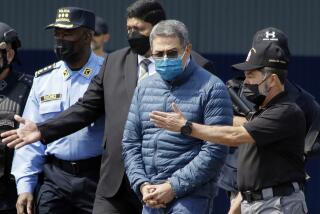U.S. Policy Weakens Democracy in Vulnerable Honduras
Honduras is a Reagan Administration success story--at least on the surface. But, inside, the original banana republic may be rotting.
This month 50,000 American and Honduran troops begin maneuvers called “Solid Shield,” a mock battle with Nicaraguan invaders. This massive display of force is but the latest in a continuous series of joint exercises that have justified the gradual construction of airstrips and bases and the prepositioning of fleets of U.S. armored personnel carriers, tanks and helicopters. Just north of the capital, 1,200 U.S. troops man a command base at Palmerola.
The U.S. presence has multiple purposes: to intimidate Nicaragua, to train and backstop the contras, and to have the assets in place should the White House order a coup de grace against the Sandinistas.
The Reagan Administration has deftly defused Honduran sensibilities about this “imperialist” presence. Public opposition is amazingly muted and many Hondurans even welcome on-site American protection. This anomaly in late 20th-Century U.S.-Latin American relations is the result of clever, concerted U.S. policies, and of the special characteristics of Honduras.
The United States has cultivated the compliance of the key sectors in Honduran political life. The Pentagon is providing the military with $80 million a year in assistance, plus training to convert what was essentially a domestic constabulary into a modern military machine. Programs of the Agency for International Development benefit businessmen, the middle classes and the politicians and bureaucrats that co-administer and disburse the funds. If distributed equally, AID’s lavish annual budget of $180 million would provide each Honduran family of five with nearly $200, a handsome sum in a country with a per-capital income of under $700.
A sophisticated “psychological operations” campaign, orchestrated by the CIA and disseminated by the local media, stirs fears of a Sandinista invasion and paints frightening pictures of life under communism in Nicaragua. More publicly, the United States wins friends through hundreds of Peace Corps volunteers and a plethora of AID-funded private voluntary agencies. U.S. values are mainlined to middle-class Hondurans through satellite dishes, videotapes and Rambo toys.
Economically poor, politically immature and culturally vulnerable, Honduras is particularly defenseless to resist this American onslaught. One of the hemisphere’s most undeveloped nations, half of its 4.7 million people lack access to potable water and 40% of the adults are illiterate. The dominant political parties are more interested in splitting up the spoils than in forging a national development strategy. Honduran businessmen protect their own interests, but unlike their counterparts in, say, El Salvador, are not accustomed to participating in the defining of national interest. In fact, there is a problem with defining Honduras; the population, dispersed over a wide area, lacks a strong, distinct national culture.
So Honduras is penetrated by U.S. military forces, is host to thousands of Nicaraguan contras, and reliably parrots U.S. objections to regional peace plans that might leave the Sandinistas in power.
But looking inside Honduran society, one sees that the apparent U.S. success could jeopardize Honduran democracy and risk the broader goal of pulling all of Central America into the democratic orbit.
Many Hondurans whisper, Somos un pais comprado-- we’re a bought country. When political leaders are widely seen to have forfeited national sovereignty, the institutions they head are tarnished.
Frustrated by Honduran indiscipline and passivity, AID often seizes the initiative, attempting to dictate policies ranging from taxation to social security to agricultural research. The unintended result is to undercut the prestige of Honduran authorities, and perhaps to delay the development of indigenous capabilities.
Government corruption is not new in Honduras, but U.S. aid greases it, even rationalizes it--it’s only “gringo” money.
U.S. military exercises and the contra war frighten investors, both Honduran and foreign. Dismal investment rates are a cause of the recent economic decline and jeopardize future recovery. Without economic and social progress, democracy is unlikely to survive.
The military “modernization” is all-too-reminiscent of U.S.-sponsored programs elsewhere that culminated in coups. Periodic political instability in many Latin American nations makes coups likely unless the military is clearly subordinate to civilian rule, as in Mexico and Costa Rica.
These disturbing trends suggest that a U.S. policy intended to defend democracy may inadvertently be undermining it. So far, the warning signs lead to a prognosis that is hypothetical; the success of the U.S. military buildup is tangible. Clearly, U.S. policy toward Honduras is made less with an eye toward Honduran political development than as a component of the relentless campaign to destroy the Sandinistas.
More to Read
Sign up for Essential California
The most important California stories and recommendations in your inbox every morning.
You may occasionally receive promotional content from the Los Angeles Times.










